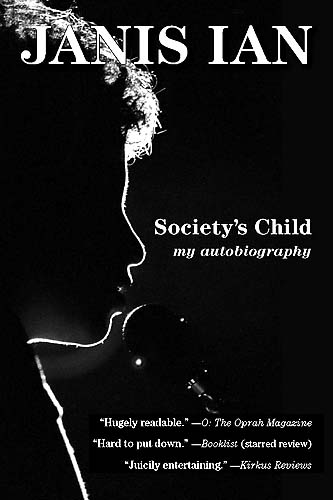Society’s Child
by Janis Ian

Society’s Child – My Autobiography |

CD Best of Janis Ian – The Autobiography Collection , |
Society’s Child
by Janis Ian

Society’s Child – My Autobiography |

CD Best of Janis Ian – The Autobiography Collection , |
|
I have always been an enormous fan of Janis Ian. Along with my whole generation in the 1970s I was stunned by the sharpness and excruciating honesty of At Seventeen. All my teenage fears and anxieties – the certainty that everyone else was more attractive, more loved and coping far better than I was – expressed in the stark, under-stated lyrics of Janis Ian's song. Nobody had ever put that in a song before, or, as far as I knew, said it out loud. Of course it was written from the female point of view but its message was gender-universal. This was the song that convinced me at the deepest level that I was not alone. The song has proved immortal. Each new generation rediscovers it, and has no idea how long it has been around. The song will never grow any older, but thankfully those it speaks to will. |
|
"
I wrote about things it humiliated me to talk about—the mortification I felt when I realized I’d lusted, not to be an artist, but to be famous. The shame I felt when television directors would ask me to “Move, damnit!” and my body would freeze because I was convinced it was so ugly. " |
"
By the time I finished the second verse two months later, I’d decided I’d never sing it in public. It was just too humiliating. I was sure no one else felt that way. Everyone else was more popular, more socially adept, than I’d ever been. No one would relate to it; they’d probably laugh. " |
|
This was by no means Janis' first song; Hair of Spun Gold had been published in Broadside alongside the works of such as Bob Dylan, Tom Paxton, Pete Seeger and Buffy Saint-Marie when she was thirteen years old, and she began performing publicly in that same year. Society's Child, the song that confronted racist attitudes in American society (and which gives the autobiography its title) followed shortly afterwards to a storm of death threats and controversy. As her career progressed, Janis continued to produce intensely intimate and heart-rending songs, dealing with topics such as loneliness, loss, desertion, casual relationships, obsessive love, falling out of love, jealousy, resentment and self-delusion – as well as some happier topics too of course. What they all had in common was the superb technical craftsmanship, powerful original imagery and unmerciful honesty that is the Janis Ian trademark. |
|
"
Nigger lover! Nigger lover! Nigger lover! I was standing alone on a stage in Encino, California,halfway through the first verse of my song “Society’s Child.” Come to my door, baby Face is clean and shining black as night My mama went to answer You know that you looked so fine Now, I could understand the tears and the shame She called you “Boy” instead of your name The problem had begun with a lone woman screaming out the words “Nigger lover!” Then the people sitting around her had joined in, chanting as though they were at a religious service. They were |
even chanting in time to the song. “Nigger lover! Niggerlover! beat beat beat beat Nigger lover! Niggerlover! beat beat beat beat.” It was difficult to concentrate on keeping my own time. The chant degenerated into yelling, twenty or thirty people in the sold-out concert hall. I peered to the left, where the sound came from, and saw some of them beginning to rise. They were shaking their fists in the air as the rest of the audience looked on in stunned silence. I was having a hit record. I was singing for people who wanted me dead. I was fifteen years old. " |
|
But let me be honest also: when I requested a review
copy of Society's Child, I imagined it would be pretty
much another celebrity autobiography; fairly impersonal,
full of false modesty, chronicling the artist's rise to fame,
mentioning some musical influences, flattering her fans
and remarking about how wonderful all her friends in the
music industry are. I couldn't have been more wrong. |
|
"
People threatened to burn down the venues I worked in, to run me over in the street, to shoot me while I was on stage. " |
|
The book contains the most sickening account of
child abuse that I have ever come across, as well as
many examples of the paranoid fear of socialists, intellectuals,
or people different in any way, that poisons such
a large section of American society. |
|
"
I automatically began making an excuse for him, saying, He’s only hit me twice, in seven years . . . I stopped myself short. Even I could hear how bad that sounded. " |
|
The feeling you are left with is one of boundless optimism
for what talent and determination can overcome,
and equally boundless admiration for Janis herself and
the way she has lived her life. |
|
"
At its best, my business is the business of failure. You fail every single day. I don’t know of another business that grinds your nose into the dirt quite so often. You have to be stubborn. You have to have faith in yourself. You have to be egocentric, and stupid about hanging in there. " |
|
I started after midnight and read the book at one sitting: it was the most compulsive thing I read all year. It is before all else a marvellous, intensely personal story, gracefully told. Even if you have never heard of Janis Ian and have no more than a passing interest in contemporary music, this is something you really don't want to miss. |
|
This review first appeared in Issue 13 of Gold Dust magazine and was accompanied by an interview with Janis. For the sake of completeness I have included this interview: |











